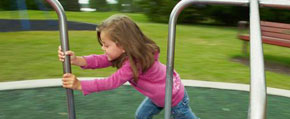We are pleased to announce an exciting new alliance between Active Living Research and GP RED to co-host and coordinate...
The Production, Communication, and Contestation of Physical Education Policy: The Cases of Mississippi and Tennessee
Dyson, B., Wright, P., Amis, J., Ferry, H., & Vardaman, J. (2011). The Production, Communication, and Contestation of Physical Education Policy: The Cases of Mississippi and Tennessee. Policy Futures in Education, 9(3), 367-380.
The purpose of this study was to explore the production, communication, interpretation and contestation of new physical education (PE) and physical activity (PA) policy initiatives introduced in Mississippi and Tennessee. These states provide a relevant context to study such issues since Mississippi has the highest and Tennessee has the fifth highest rates of childhood obesity in the United States (Trust for America’s Health, 2009). The social ecological model was used as a theoretical framework to interpret the social, economic, temporal, and political interactions that shaped the development, interpretation, and implementation of these policies (Stokols, 1992). A multiple level case study design (Yin, 2003 was adopted in which the policy process was analyzed and compared across eight high schools. We purposefully selected four high schools in each state that provided a broad range of contextual differences and collected data in real-time during a one year period. We conducted 73 interviews with key stakeholders including policymakers, school administrators, teachers, and students and observed PE lessons and school-based activities. The researchers identified themes from the data: Policy process, Expectation of compliance, Unfunded Mandate, Problematic Policy Enactment, Academic Pressure, Marginalized Status of PE, Narrow PE Curriculum, and Dislike of PE. Even though new PE and PA legislation had been passed in both states, no substantive change occurred in any of the schools during our study. This work moves beyond a superficial understanding of how policy initiatives impact PA and PE provisions within schools, particularly at the secondary level. We recommend the development of support systems within the school through the creation of clear goals, strategic plans, and professional development to implement new policy initiatives.
Related Tools & Resources
STAY UP TO DATE
RECENTLY ADDED TOOLS & RESOURCES
MOVE! A BLOG ABOUT ACTIVE LIVING
The "Active Living Conference" aims to break down research and practice silos and...







